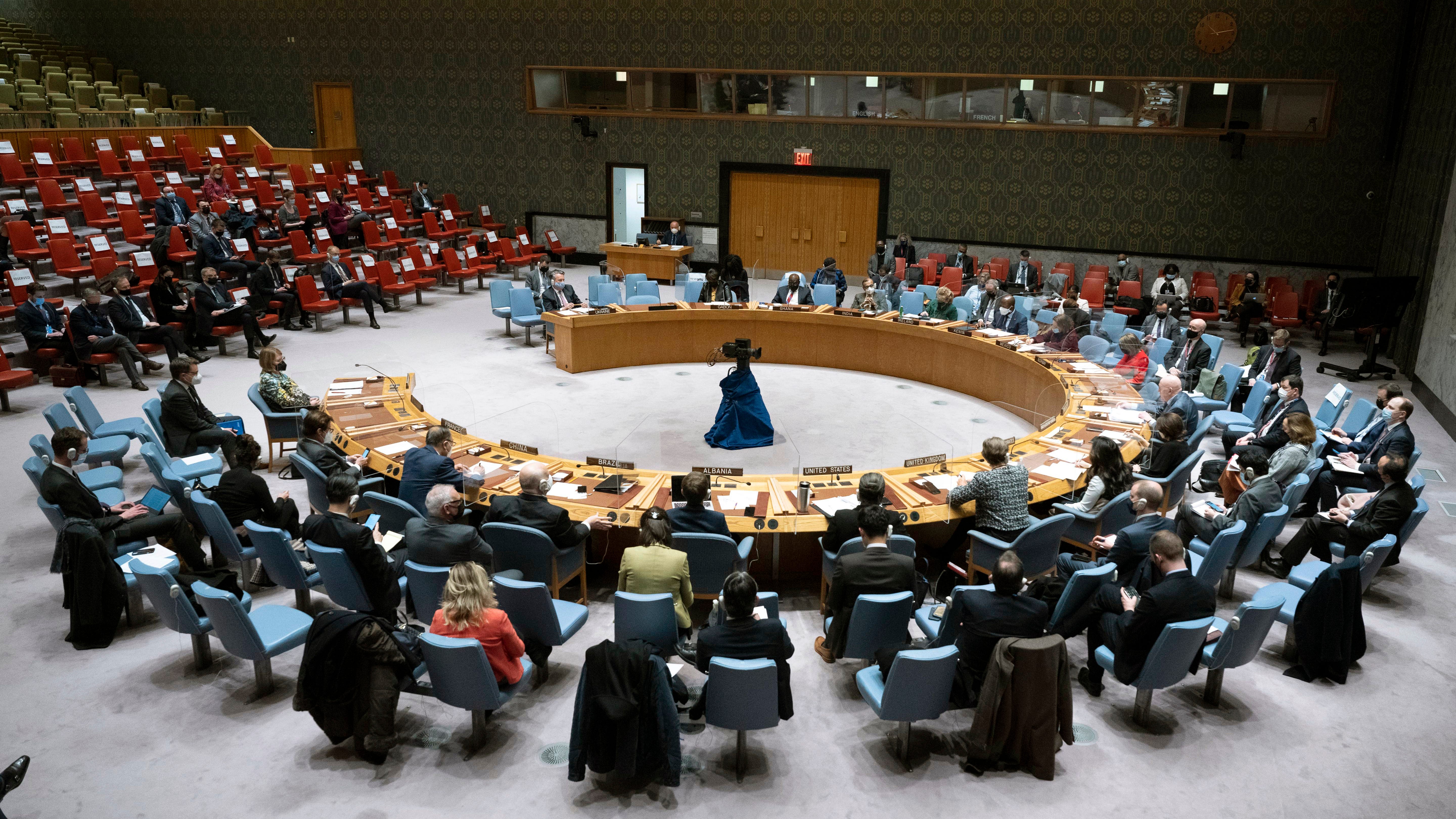NEW YORK (1010 WINS/AP) -- Europe is on the brink of war after Russian President Vladimir Putin announced that Moscow is recognizing the independence of areas in eastern Ukraine, including the separatist “republics” of Donetsk and Luhansk, as well as territory currently held by Ukrainian forces. In a fiery speech Monday, Putin said Ukraine was “created by Russia” and ordered “peacekeeping” troops into the eastern part of the country, a move that's seen as a pretext for possible further invasion. The West has announced sanctions, while U.N. Security Council members condemned the move as a violation of international law.
Tuesday, Feb. 22, 2022
6:36: Secretary of State Blinkin cancels meeting with Russian counterpart
Secretary of State Antony Blinken announced on Tuesday that his meeting with Russian Foreign Minister Sergey Lavrov had been canceled, but the US would continue to push for diplomatic resolutions despite new actions levied against Russia.
"The further renewed Russian invasion of Ukraine that has now begun means clearly that the idea of having a meeting this week with Foreign Minister Lavrov, to pursue diplomacy — diplomacy now rejected by Russia — does not make sense," he said.
Meanwhile, visiting Ukrainian Foreign Minister Dmytro Kuleba, commended the Biden administration's sanctions against Russia but pushed for further action.
"The world must respond with all its economic might to punish Russia for the crimes it has already committed, and ahead of the crimes it plans to commit," Kuleba said. "Hit Russia’s economy now, and hit it hard."
He said his government would also push for diplomacy to deter a full Russian invasion, signaling Ukrainians would "fight for every inch of our land, and every city, and every village. To fight until we win."
2:22 p.m.: Biden to send more troops to Eastern Europe, impose sanctions citing start of Russian "invasion."
President Joe Biden announced Tuesday that the U.S. will impose its first fleet of sanctions on Russian financial institutions and its elite, acknowledging the "beginning of a Russian invasion of Ukraine."
"Who in the Lord's name does Putin think gives him the right to declare new so-called countries?" Biden said.
He also announced the deployment of additional forces and equipment to Eastern Europe, as well as the suspension of the Nord Stream 2 gas pipeline, warning that the US would continue to respond to Russia's escalating actions.
"We still believe that Russia is poised to go much further in launching a massive military attack against Ukraine," Biden said. "I hope I’m wrong about that—hope we’re wrong about that—but Russia has only escalated its threat against the rest of Ukrainian territory, including major cities, including the capital city of Kyiv."
12:15: p.m.: Putin calls for recognition of Crimea as Russia
After Russian lawmakers authorized President Vladimir Putin to use military force outside the country on Tuesday, Putin laid out three conditions to end a crisis that has threatened to plunge Europe back into war and raised the specter of massive casualties, energy shortages and economic chaos around the globe.
He called for international recognition of Ukraine's Crimean Peninsula as part of Russia, an end to Ukraine’s NATO membership bid and a halt to weapons shipments there.
The West has decried Russia's annexation of Crimea as a violation of international law and has previously flatly rejected permanently barring Ukraine from the NATO alliance.
Putin claimed Russia's 2014 annexation of Crimea should be internationally recognized as a legitimate reflection of the local population's choice, likening it to a vote for Kosovo independence.

11:15 a.m.: Lawmakers give Putin permission to use force outside Russia
Russia’s upper house of parliament, the Federation Council, has given President Vladimir Putin permission to use military force outside the country in what could presage a broader attack on Ukraine after the U.S. said an invasion was already underway there.
Putin had asked the country’s parliament for permission to use military force outside the country.
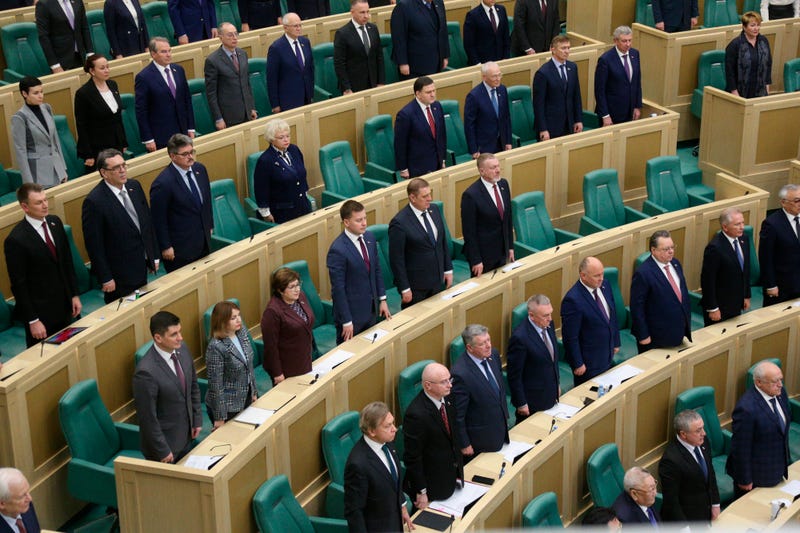
Several European leaders said earlier in the day that Russian troops have moved into rebel-held areas in eastern Ukraine after Putin recognized their independence. But it was unclear how large the movements were, and Ukraine and its Western allies have long said Russian troops are fighting in the region. Moscow denies those allegations.
Putin’s letter to the upper house of parliament would formalize a Russian military deployment to the rebel regions. Lawmakers are expected to quickly rubber-stamp Putin’s request during a session Tuesday.
The White House on Tuesday began referring to Russian troop deployments in eastern Ukraine as an “invasion” after initially hesitating to use the term — a red line that President Joe Biden has said would result in the U.S. levying severe sanctions against Moscow.
White House press secretary Jen Psaki also alluded to the Russian action as being an invasion in a Twitter post commenting on Germany chancellor Olaf Scholz decision to halt the Nord Stream 2 gas pipeline in response to Russia’s actions.
The U.S. president “made clear that if Russia invaded Ukraine, we would action would act with Germany to ensure Nord Stream 2 does not move forward,” Psaki said.
11:00 a.m.: Biden to speak from White House at 1 p.m.
President Biden will give “an update on Russia and Ukraine” from the East Room of the White House at 1 p.m.
Word of Biden’s announcement comes after the White House began referring to Russian troop deployments in eastern Ukraine as an “invasion” on Tuesday after initially hesitating to use the term.
Biden has previously said an “invasion” would be a red line that would result in the U.S. levying severe sanctions against Moscow.
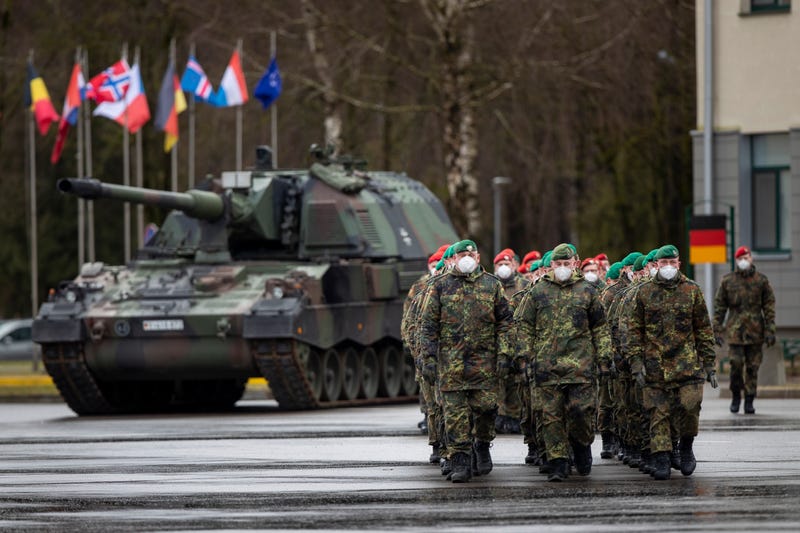
9:45 a.m.: White House calls Russian moves on Ukraine an "invasion"
The White House on Tuesday began referring to Russian troop deployments in eastern Ukraine as an “invasion” after initially hesitating to use the term — a red line that President Joe Biden has said would result in the U.S. levying severe sanctions against Moscow.
Several European leaders said earlier in the day that Russian troops have moved into rebel-held areas in eastern Ukraine after Russian President Vladimir Putin’s recognized their independence — but some indicated it was not yet the long-feared, full-fledged invasion.
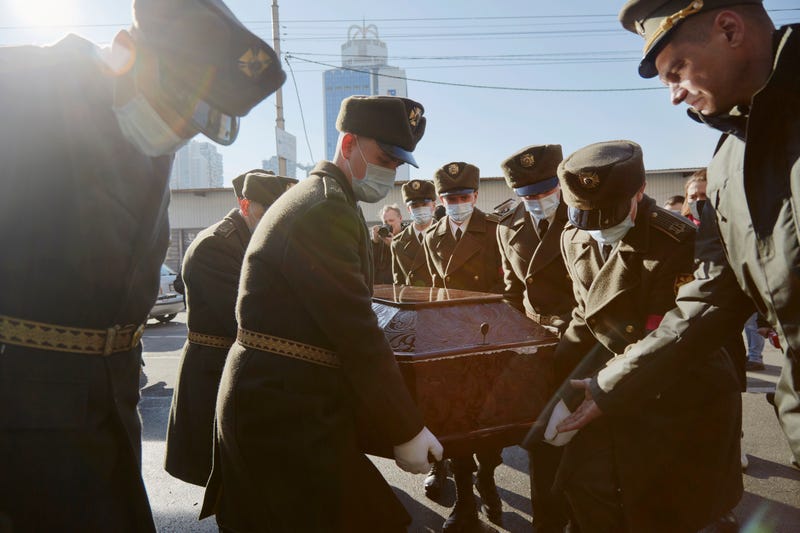
But the White House signaled a shift in its own position.
“We think this is, yes, the beginning of an invasion, Russia’s latest invasion into Ukraine,” said Jon Finer, principal deputy national security adviser. He said “latest” was important. “An invasion is an invasion and that is what is under way.”
The White House decided to begin referring to Russia’s actions as an “invasion” because of the situation on the ground, according to a U.S. official who spoke on the condition of anonymity to discuss internal deliberations.
The administration resisted initially calling the deployment of troops because the White House wanted to see what Russia was actually going to do. After assessing Russian troop movements, it became clear it was a new invasion, the official added.
6:30 a.m.: Russia recognizes Ukraine-held areas in addition to rebel areas
Russia announced that its recognition of independence for areas in eastern Ukraine extends to territory currently held by Ukrainian forces — further raising the stakes amid Western fears that Moscow a full-fledged invasion of Ukraine is imminent.
Kremlin spokesman Dmitry Peskov said that Russia has recognized the rebel regions’ independence “in borders that existed when they proclaimed” their independence in 2014. Ukrainian forces later reclaimed control of large part of both regions during a nearly eight-year conflict that has killed over 14,000 people.
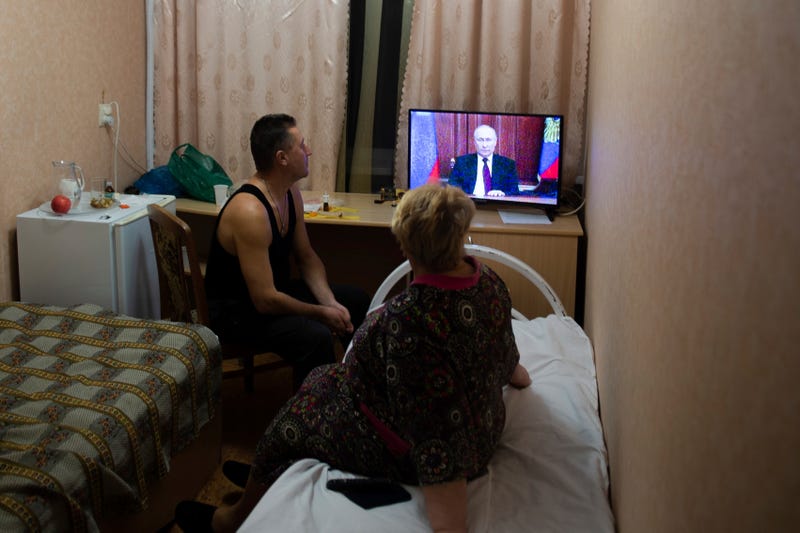
The announcement comes a day after Russia said it would recognize the independence — but didn't say exactly what it considered the borders of those areas to be. The move was widely seen in the West to presage a Russian invasion.
Late Monday, convoys of armored vehicles were seen rolling across the separatist-controlled territories. It wasn’t immediately clear if they were Russian.
Russian officials haven't yet acknowledged any troop deployments to the rebel east, but Vladislav Brig, a member of the separatist local council in Donetsk, told reporters that the Russian troops already had moved in, taking up positions in the region's north and west.
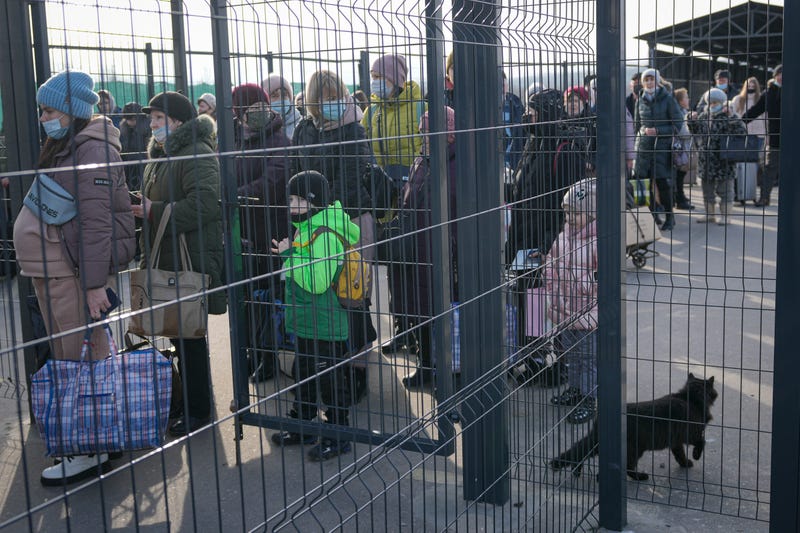
Western leaders have denounced the move and said they are preparing to announce sanctions.
Ukraine’s President Volodymyr Zelenskyy sought to project calm, telling the country in an address overnight: “We are not afraid of anyone or anything. We don’t owe anyone anything. And we won’t give anything to anyone.” His foreign minister, Dmytro Kuleba, would be in Washington on Tuesday to meet with Secretary of State Antony Blinken, the State Department said.
“The Kremlin recognized its own aggression against Ukraine,” Ukrainian Defense Minister Oleksii Reznikov said on Twitter, describing Moscow’s move as a “New Berlin Wall” and urging the West to quickly slap Russia with sanctions.
6:00 a.m.: Germany suspends Nord Stream 2 gas pipeline
Germany has taken steps to halt the process of certifying the Nord Stream 2 gas pipeline from Russia, Chancellor Olaf Scholz said, as the West started taking punitive measures against Moscow over the Ukraine crisis.
Scholz told reporters in Berlin that his government was taking the measure in response to Moscow’s actions in Ukraine.
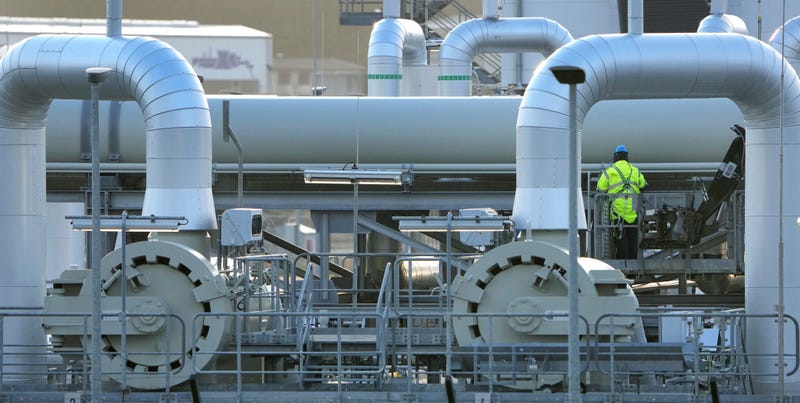
The decision is a significant move for the German government, which had long resisted pulling the plug on the project despite pressure from the United States and some European countries to do so. Washington has for years argued that building another pipeline bringing natural gas from Russia to Germany increases Europe’s reliance on Russian energy supplies.
Scholz said that the government had decided to “reassess” the certification of the pipeline, which hasn’t begun operating yet, in light of the latest developments.
“That will certainly take time, if I may say so,” he said.
Germany meets about a quarter of its energy needs with natural gas, a share that will increase in the coming years as the country switches off its last three nuclear power plants and phases out the use of coal. About half of the natural gas used in Germany comes from Russia.
5:30 a.m.: European officials to discuss sanctions against Russia
European Union foreign ministers will meet Tuesday to decide what sanctions to impose over Russia’s decision to recognize two separatist regions in southeast Ukraine, the EU’s top diplomat said.
EU foreign policy chief Josep Borrell said the meeting in Paris “will take the political decisions vis-à-vis the European response.”
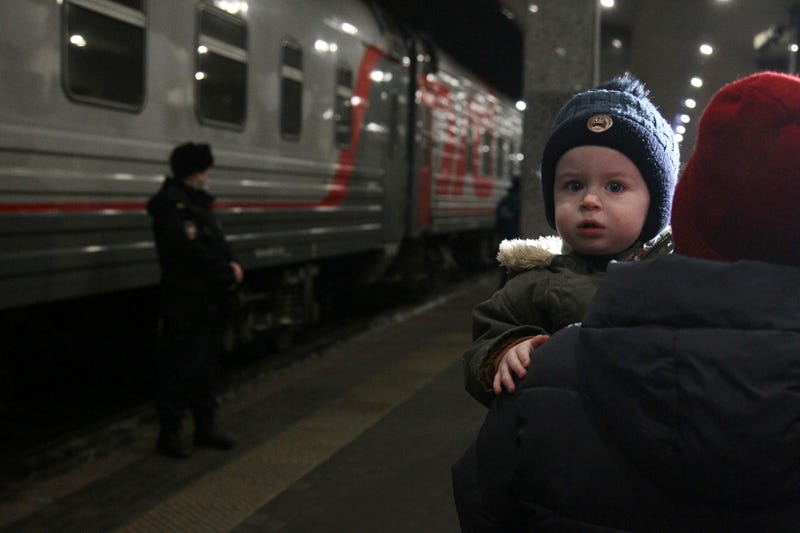
“Clearly, that response will be in the form of sanctions,” Borrell said. He said the aim is not to impose the whole range of sanctions that the EU has prepared should Russian invade Ukraine, but rather to address the recognition of Donetsk and Luhansk as independent.
Asked whether Russia’s decision to send “peacekeepers” in already amounts to an invasion, Borrell said, “I wouldn’t say that’s a fully fledged invasion, but Russian troops are on Ukrainian soil.”
5:00 a.m.: UK to impose sanctions against Russia
Prime Minister Boris Johnson says the U.K. will introduce “immediate” economic sanctions against Russia, and he warned that President Vladimir Putin is bent on “a full-scale invasion of Ukraine.”
Johnson said Putin had “completely torn up international law” and British sanctions would target not just the regions of Donetsk and Luhansk but “Russian economic interests as hard as we can.”
Johnson is to set out further details of the sanctions in the House of Commons later Tuesday.
He told broadcasters that this would be “just the first barrage of U.K. economic sanctions against Russia because we expect, I’m afraid, that there is more Russian irrational behavior to come.”
“I’m afraid all the evidence is that President Putin is indeed bent on a full-scale invasion of the Ukraine, the overrunning, the subjugation of an independent, sovereign European country and I think, let’s be absolutely clear, that would be absolutely catastrophic.”
4:00 a.m.: Putin gets no support from UN Security Council
Russian President Vladimir Putin received no support from members of the U.N. Security Council at an emergency meeting Monday night for his actions to bring separatists in eastern Ukraine under Moscow’s control.
The U.S. called his moves a pretext for a further invasion, many members condemned his violation of Ukraine’s territorial integrity, and even close ally China urged diplomacy and a peaceful solution.
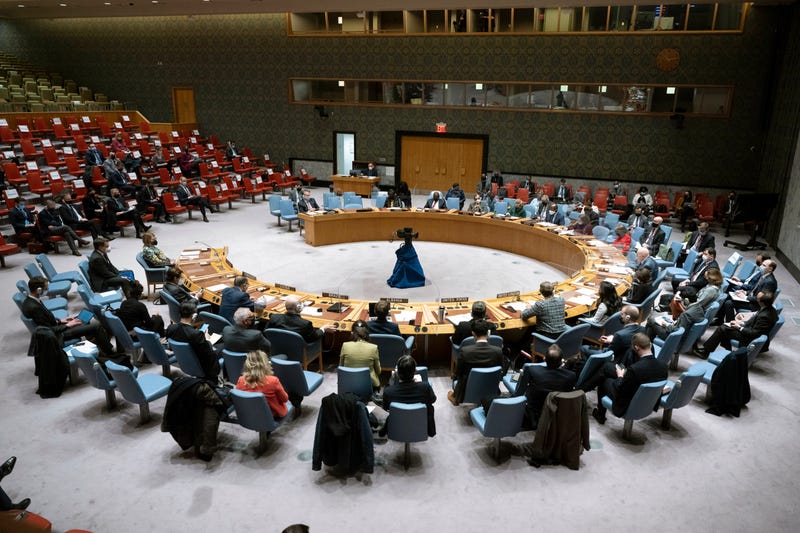
Ukraine called for the rare evening session along with the U.S., five European countries and Mexico to condemn Putin’s actions earlier Monday to recognize the independence of the separatist regions of Luhansk and Donetsk, scenes of an eight-year war, and order his military to “maintain peace” there.
Russia happens to hold the Security Council’s rotating presidency this month and wanted the meeting to be closed, but diplomats said they agreed to an open session under intense pressure from Western and other members.
Linda Thomas-Greenfield, the U.S. ambassador to the United Nations, dismissed “as nonsense” Putin’s announcement that Russian troops would be in the separatist area known as Donbas as peacekeepers, saying their presence is “clearly the basis for Russia’s attempt to create a pretext for a further invasion of Ukraine.” She said he gave the world a choice, and it “must not look away” because “history tells us that looking the other way in the face of such hostility will be a far more costly path.”
Putin is testing to see “how far he can push us all,” and all countries must stand up for the sovereignty, independence and territorial integrity of Ukraine and all countries, Thomas-Greenfield said.
British U.N. Ambassador Barbara Woodward said there are reports of Russian troops and tanks now entering Donetsk and Luhansk and she warned that “an invasion of Ukraine unleashes the forces of war, death and destruction on the people of Ukraine.”
She urged the Security Council to call on Russia to stop any military action, condemn aggression against a sovereign state and defend Ukraine’s territorial integrity, and call on Russia to respect its obligations under the U.N. Charter. That is virtually impossible given Russia’s veto power on council actions.
“Russia has brought us to the brink,” Woodward said. “We urge Russia to step back.”
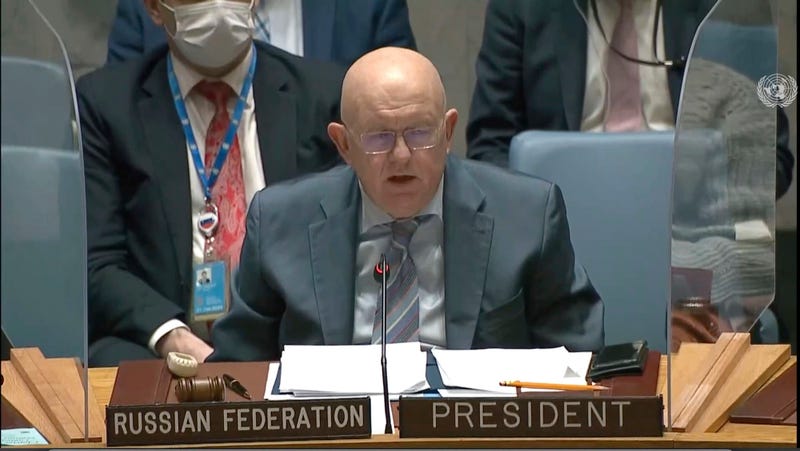
Russian U.N. Ambassador Vassily Nebenzia accused the United States and its Western allies of egging on Ukraine -- which he said has concentrated a 120,000-strong military contingent along the contact line with pro-Russian separatists in the east -- toward “an armed provocation.”
He accused Ukraine of sharply increasing shelling in residential areas of Luhansk and Donetsk over the past weekend as well as in some Russian towns and villages near the border. “So it has become clear that Donbas is on the brink of a new Ukrainian military adventure as was already the case in 2014 and 2015,” he said, explaining that is why Putin made the announcements earlier Monday.
The separatist authorities said Monday that at least four civilians were killed by Ukrainian shelling over the past 24 hours, and several others were wounded. Ukraine’s military said two Ukrainian soldiers were killed over the weekend, and another serviceman was wounded Monday. Ukrainian military spokesman Pavlo Kovalchyuk insisted that Ukrainian forces weren’t returning fire.
The Associated Press contributed to this report.


